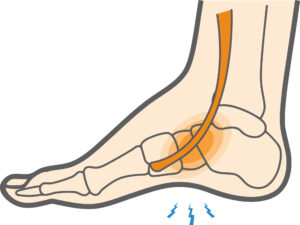 Extensor tendonitis in the foot is a painful condition that can affect anyone, especially those engaged in physical activities. This article delves into the symptoms, causes, prevention, medical treatment, and home remedies for extensor tendonitis.
Extensor tendonitis in the foot is a painful condition that can affect anyone, especially those engaged in physical activities. This article delves into the symptoms, causes, prevention, medical treatment, and home remedies for extensor tendonitis.
Symptoms of Extensor Tendonitis in the Foot
Extensor tendonitis often manifests through:
- Pain: Typically, pain develops on the top of the foot and may become more pronounced with movement.
- Swelling: Swelling around the painful area is common.
- Stiffness: You might experience reduced mobility in your foot.
- Warmth: The affected area can feel warm to the touch.
What Causes Extensor Tendonitis?
Several factors contribute to the development of extensor tendonitis:
- Overuse: Repetitive activities that strain the extensor tendons can lead to this condition.
- Footwear: Ill-fitting shoes, especially those lacking proper arch support, can exacerbate the problem.
- Trauma: A direct injury to the top of the foot can trigger extensor tendonitis.
How to Prevent Extensor Tendonitis
Prevention involves:
- Appropriate Footwear: Wear well-fitting shoes with arch support and cushioning.
- Stretching: Incorporate foot and ankle stretches into your routine.
- Rest: Allow your feet time to recover after intense activities.
How Do Doctors Treat Tendonitis?
Medical treatment typically includes:
- Rest: Reducing or eliminating activities that exacerbate the condition.
- Orthotics: Doctors may recommend shoe inserts to provide better arch support.
- Physical Therapy: A physical therapist can assist with exercises to strengthen the affected area.
- Medications: Non-steroidal anti-inflammatory drugs (NSAIDs) might help reduce pain and swelling.
- Corticosteroid Injections: In some cases, these injections can alleviate symptoms.
How Can You Treat Tendonitis At Home?
Home care options:
- RICE: Rest, ice, compression, and elevation can relieve pain and reduce swelling.
- Over-the-Counter Pain Relief: Medications like ibuprofen can help.
- Calf Raises: Strengthening calf muscles can support the foot.
- Stretching: Gentle foot and ankle stretches promote flexibility.
If you’re experiencing extensor tendonitis in your foot, seek professional assistance promptly. The DFW Wound Care Center is experienced in diagnosing and treating a wide range of foot conditions, including those related to tendonitis. Our expertise in wound care encompasses various techniques to address the consequences of these conditions. With multiple clinic locations in Plano, Lewisville, Irving, Desoto and immediate openings, you can access our expert care easily. Don’t let extensor tendonitis hinder your foot’s health and your quality of life — contact the DFW Wound Care Center today to schedule an appointment. Your well-being is our top priority.
Contact us
Schedule an appointment
with our specialists by contacting us or calling our:
